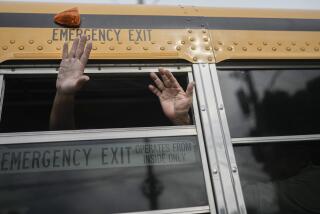U.S. Expects ‘January Surprise’ From Nicaragua
- Share via
WASHINGTON — The United States expects Nicaragua’s Sandinista regime to unveil a “January surprise”--a new move toward political reform or peace in Central America--in an attempt to sway a forthcoming House of Representatives vote on resuming U.S. military aid to the Contras, a senior State Department official said Thursday.
The Feb. 3 vote, seen here as a life-or-death decision for the 15,000-man Contra guerrilla army, comes as a peace plan adopted by Nicaragua and its four Central America neighbors last summer shows signs of bogging down.
President Daniel Ortega of Nicaragua and the presidents of the four surrounding democracies will meet today (cq) in San Jose, Costa Rica, to assess progress toward peace and democratic reforms outlined in the accord.
sh Differing Viewpoints
The Reagan Administration maintains that the rebel army must be kept intact to force serious bargaining for peace. Nicaraguan President Daniel Ortega calls the Contras the only remaining obstacle to implementing a regional peace accord and democratic reforms inside Nicaragua.
The senior official said that the Administration will begin an intense lobbying effort late this month on behalf of the Contra aid package, which is being drafted in talks among the White House, the State Department and key congressional supporters.
The official said, however, that nearly all 435 House members already are “clear yes or no votes” and that approval of the aid may rest on the ability of the Administration to sway the 35 to 50 legislators who remain undecided.
The senior official, who briefed reporters on the political situation in Central America, spoke on condition that he not be named.
sh Option ‘Rumors’
He said that “rumors” suggest Nicaraguan President Daniel Ortega will try to appeal to undecided House Democrats in one of several ways: by releasing some of the estimated 4,000 to 9,000 political prisoners inside Nicaragua, by repealing parts of a national state of emergency or by agreeing to conduct face-to-face peace talks with the Contras’ six-member political leadership.
In similar moves last fall, Ortega released 981 prisoners and agreed to indirect talks with the Contras shortly before Congress voted on appropriations for non-military aid to the rebels.
“We’re still waiting for the January surprise,” the official said. “We still expect Ortega to make at least one move” to influence the House vote.
He added, however, that the White House has not lost a congressional vote on aid for the Contras since March, 1986, and remains optimistic about its prospects in the upcoming battle.
“Whatever we’re doing, it’s working,” he said.
sh Specifics Under Discussion The Contra aid package probably will be filed in Congress the day after President Reagan’s Jan. 25 State of the Union address. While the specifics remain to be agreed on, officials anticipate asking Congress for a multimillion-dollar package of both military and so-called humanitarian aid, such as food and clothing, to be extended to the rebels over six to 12 months.
He also predicted that today’s meeting of the five Central America presidents--billed by a White House official earlier this week as crucial to the Contra aid vote--will produce only “ambiguity” and have no serious impact on Congress’ view of the rebels.
Lt. Gen. Colin L. Powell, Reagan’s national security adviser, met with the leaders of Honduras, El Salvador, Guatemala and Costa Rica last week to drive home the U.S. view that the Contras are essential to the peace process. Costa Rican President Oscar Arias Sanchez, the architect of the peace plan, has been the most vocal of the four in opposing continued aid to the Contras.
Those four U.S.-backed democracies are expected to agree to a new deadline for compliance with the peace accord, the official said. U.S. officials also expect them to refrain from direct criticism of either Nicaragua or the rebels in an effort to keep the sagging peace process going, he said.
More to Read
Sign up for Essential California
The most important California stories and recommendations in your inbox every morning.
You may occasionally receive promotional content from the Los Angeles Times.










